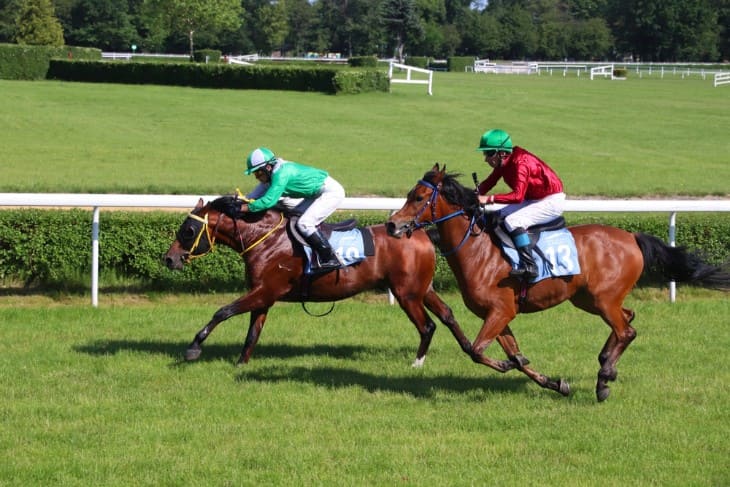Horse betting is a tradition that has lasted centuries, so it doesn’t surprise that various methods of betting developed. In most sports, the only way to go is fixed-odds betting but in horse racing, there is something much better – pool betting. Also known as the pari-mutuel system, pool betting brings way more dynamics to the betting. Instead of fixed odds, the potential winning largely depends on other bettors, as they are competing against each other, instead of competing against the house.
This way of betting doesn’t just boost the excitement. It often leads to way higher potential payouts – yet another factor that contributes to the overall thrill. Pool betting is popular in many countries and while it may sound too complicated to you at the moment, things are actually pretty simple once you get into them.
Understanding the Basics
As mentioned, pool betting might sound complicated to someone new to horse betting but actually, there aren’t more than a few aspects that need explanation, to understand how everything works:
- The common pool is one of the first terms to learn about. In pool betting, all bets of a particular type (e.g., win, place, show) are combined into a single pool. This pool represents the total amount of money wagered by all bettors on that specific type of bet for a particular race.
- This leads us to a term called payout structure. The payouts in pool betting are not predetermined like in fixed-odds betting. Instead, they depend on the total amount of money in the pool and the number of winning bets. After deductions (taxes and operator's commission), the remaining pool is divided among the winners.
Before the payouts are calculated, a certain percentage is deducted from the total pool. This includes taxes required by the government and the operator's commission for facilitating the betting process. Once the race is over and the results are determined, the winning bets are identified based on the outcome of the race and the specific type of bet. For example, in a win bet, the horse that finishes first is the winner.
- So, the next thing to learn about is payout calculation. The total pool is divided among the winning bets. The larger the pool and the fewer the winning bets, the higher the potential payout. Each winning bet receives a portion of the pool based on the amount wagered and the overall size of the pool.
When it comes to odds and dividends, pool-betting odds are presented in fractional format (e.g., 3/1, 5/2, etc.). These odds represent the potential return on your bet, including your initial stake. The odds are not fixed and can change as more bets are placed.
Now let’s take a look at one payout example:
- Let's say the total pool for the win bet is $10,000, and there are three winning bets.
- After deductions, the pool is $9,000.
- If you placed a $20 bet on the winning horse, your payout would be calculated based on your share of the pool. If your bet is one of the three winning bets, you'd receive a portion of the $9,000 pool, which is divided among the winners.
Of course, to enjoy pool betting, you need access to all relevant information, which leads us to the tote board. This board displays important information for bettors, including current odds, pool sizes, and potential payouts. It helps bettors make informed decisions before placing their bets.

Types of Pool Bets
In pool betting, there is much more than predicting the winning horse. There are several bet types, with different rules and potential payouts. Each type of bet brings its own specifics, whether it’s about risk tolerance or potential payout. So, it’s good to do a little analysis of the horses, jockeys and similar things, before deciding what kind of a pool bet you want to place.
Now, let’s take a look at different types of pool bets:
- Win Bet: Obviously, you're selecting a single horse to finish first with this bet type. If your horse wins, you will receive a payout based on the pool and the number of winning bets.
- Place Bet: In this case, you are betting on your horse to finish in the top two (or sometimes three) positions in the race. Of course, the potential payout is notably lower compared to the win bet in this case.
- Show Bet: To win a show bet, your horse should finish in one of the top three positions. Logically, with lower risk, you may also count on lower potential payout.
- Exacta Bet: This is where things become a little bit more interesting because you’re choosing two horses to finish first and second, in the exact order. As this is very difficult to predict, the payout is among the highest in pool betting.
- Trifecta Bet: Trifecta is even more difficult compared to Exacta bet, as you need to pick up three horses and guess the exact order. This is one of the most challenging types of pool betting, with some of the highest potential awards.
- Superfecta Bet: The “super” in its name suggests that this is the hardest kind of pool bet around. Indeed, it is extremely difficult to predict four horses to finish first, second, third and fourth in the specific order. Still, the potential payout is impressive.
- Quinella Bet: If you prefer something less risky, something easier to guess, Quinella bet is the one for you, as you need to predict the top two horses, but a specific order is not required. Quinella bets provide a bit more flexibility and are generally easier to win than exacta bets but the potential payout is lower too.
- Daily Double, Pick 3, Pick 4, Pick 6: These bets are about guessing winners of consecutive races (Daily Double), three races (Pick 3), four races (Pick 4), or six races (Pick 6). Predicting the outcomes is extremely difficult and, as you may presume, the payout rises with the number of races.
Placing Bets and Claiming Wins
Placing your bet in pool betting for a horse requires several steps. You have to select your desired bet type, choose the horse(s) you want to bet on, determine your stake, and submit your wager. Here is a quick breakdown:
- Choose the Bet Type: We already talked about different bet types. This could be a win, place, show, exacta, trifecta, superfecta, quinella, or a multi-race bet like the Daily Double, Pick 3, Pick 4, or Pick 6.
- Select Your Horses: For single-race bets (win, place, show, etc.), choose the horse(s) you believe will win. In multi-race bets (Daily Double, Pick 3, etc.), select the winners of the designated consecutive races.
- Determine Your Stake: Decide how much money you want to wager on your chosen bet. There is usually a minimum and maximum stake in pool betting but focus on your budget.
- Place Your Bet: Go to a betting location, such as a racetrack or an off-track betting (OTB) facility, or use an online betting platform if available.
- And then, double-check your selections and stake before finalising your bet.
After placing your bet, you'll receive a printed betting ticket from the operator or the self-service terminal. The ticket will display the details of your bet, including the type of bet, horse selections, stake amount, race information, and a unique ticket number. Treat it like cash and keep it in a safe place until the race is over.
Claiming Your Winnings:
If your bet is successful, you can visit the same betting location where you placed your bet to claim your winnings. Present your winning ticket to the operator. The operator will verify the details and calculate your payout based on the pool and the number of winning bets.
Understanding Odds and Calculating Payouts
To calculate payouts, you need to understand the odds. They represent potential returns on your bet and to calculate them, you need to understand different types of odds. They can be presented in various formats, including fractional (e.g., 3/1), decimal (e.g., 4.00), and moneyline (e.g., +300 or -200) odds.
- Fractional Odds: The first number represents the potential profit, and the second number represents the stake. For example, with odds of 3/1, you could potentially win $3 for every £1 wagered if your bet is successful, plus you'd also receive your initial £1 stake back.
- Decimal Odds: The decimal odds represent the total potential return, including your initial stake. For example, decimal odds of 4.00 mean you could potentially win £4 for every £1 wagered, including your original $1 stake.
- Moneyline Odds: This format is a little bit more complicated, as it includes positive and negative odds. Positive moneyline odds (e.g., +300) indicate potential profit on a £100 stake, while negative moneyline odds (e.g., -200) indicate the amount you need to wager to win £100.
So, if you want to calculate potential payouts, you can use the following formulas based on the odds format:
- For fractional odds: Potential Payout = (Stake * Numerator) / Denominator + Stake
- For decimal odds: Potential Payout = Stake * Decimal Odds
- For moneyline odds:
Positive Odds: Potential Payout = (Stake / 100) * Odds + Stake
Negative Odds: Potential Profit = (100 / |Odds|) * Stake
Example:
Let's say you're placing a win bet with the following odds:
- Fractional Odds: 5/1
- Decimal Odds: 6.00
- Moneyline Odds: +500
If you wager £10:
- Fractional Odds: Potential Payout = (£10 * 5) / 1 + £10 = £60 (including initial stake)
- Decimal Odds: Potential Payout = £10 * 6.00 = £60 (including initial stake)
- Positive Moneyline Odds: Potential Payout = (£10 / 100) * 500 + £10 = £60 (including initial stake)

Research and Analysis - Key to Successful Pool Betting
Even though they can’t guarantee wins, research and analysis definitely increase your chances of predicting the outcome of a race. They help you understand the race better and help you make more educated bets. Eventually, they lead to more successful betting and a higher appreciation of sports betting.
Before you place any bet, it’s essential to gather information and evaluate different factors that can impact the race. These factors are numerous, so let’s take a look at a few of them:
- Informed Decision-Making: Random choices and gut feelings don’t win. It’s about research and analysis.
- Understanding Horse Form: Researching a horse's recent performances, past race records, and track preferences helps you gauge its current form and potential to perform well in the race you're betting.
- Trainer and Jockey Information: Learn more about trainers and jockeys, as they are as important as the horses.
- Track and Conditions: Different horses perform differently under different track conditions (e.g., turf or dirt). Weather conditions (e.g., wet or dry) can be crucial in predicting a horse’s performance too.
- Distance and Class: Analysing how a horse has performed at different race distances and in various class levels can give you an idea of its suitability for the current race.
- Recent Form: Find out if the horse has been improving or declining lately. It’s a pretty obvious indicator for your bets.
- Speed and Pace Analysis: Horse's speed figures and pace data can reveal its running style and whether it's likely to lead the race, stalk the leaders, or close from behind.
- Comparative Analysis: Compare the strengths and weaknesses of different horses to find out which one is contended and which one is an underdog.
- Betting Trends: Changes in odds and pool sizes clearly indicate which horses are popular among bettors and where value might lie.
- Long-Term Profitability: A piece of general advice - successful pool betting is not about winning every bet. It’s about making profitable decisions over the long run. Enjoy Responsibly
- Setting Limits: Make sure to set limits on the amount of time and money you spend on gambling. That will help you avoid overspending and ensure that gambling remains a form of entertainment rather than a financial burden.
- Budgeting: Create a gambling budget and do not spend money intended for essential needs.
- Enjoying Entertainment: Gambling is meant to be a form of entertainment, similar to going to a movie or dining out. Approach it with a healthy perspective and do not rely on it for financial gain. It’s just for fun!
- Positive Experience: When you gamble responsibly, you can focus on enjoying the experience, learning about the sport, and engaging with the community of fellow enthusiasts without the stress and negative emotions that come with reckless behaviour.
Summary
To summarise, pool betting is a perfect way to enjoy horse racing but it is also very important to understand all of its aspects before starting. This super-fun activity can cost you a lot if you don’t understand the basics, not just about the sport itself, but also in terms of key principles of pool betting. It’s important to understand different types of bets and to know how odds and payouts work. Furthermore, there is always the matter of responsible betting, because that’s the only right approach not just to this, but to all forms of betting.








